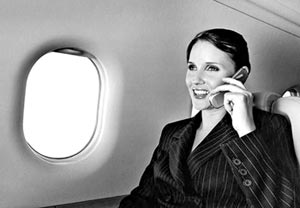
'Hi, can you hear me? I'm flying at 30,000 feet'LE BOURGET, France, June 23, 2007 (AFP) - One of the last telephone-free environments on the planet, the airplane, is about to be connected, allowing travellers to make mobile phone calls at high altitude. Requests to switch off cell phones and fasten seatbelts are a familiar part of the takeoff routine for airline passengers, but a European company has found a way to make dialling safe and link up people from above the clouds."Cabin connectivity is here and GSM phone use is both a technical and commercial reality," chief commercial officer of OnAir, Graham Lake, told AFP at the Paris Air Show this week.
His company, a joint venture between European plane maker Airbus and airline IT group Sita, received a green light from the European Aviation Safety Agency on Monday to begin fitting equipment to commercial jets. The technology is to be operated by an Air France plane for the first time in September this year and will then roll out across the world, with low-cost operators Ireland-based Ryanair and Malaysia's AirAsia some of the biggest clients. "It's the first time anywhere in the world that a system has been authorised and confirmed for the safe operation of phones and BlackBerry-type devices on aircraft," Lake said. The expansion timetable means European consumers will be the first to be able to use the technology with Air France, Ryanair, British low-cost BMI and Portugal's TAP. Approval from a handful of national telecommunication regulators are the final hurdles, Lake said."What we are confident of now is that we'll have pan-European approval to operate before the end of 2007," he added. Some companies in Southeast Asia and the Middle East are expected to begin installing the OnAir equipment in 2008, but the more complicated markets of Japan and the United States will have to wait until 2009. AirAsia, which flies throughout Southeast Asia and is planning to launch longhaul services, is an early adopter and has signed a deal with OnAir to equip it’s new fleet of 150 Airbus A320s. All planes are to be equipped by 2013, with the first connected aircraft serving routes in the next 18 months to two years. "We firmly believe that offering our clients the ability to communicate during flight is vital in this era of information technology," said Kamarudin Meranun, deputy chief executive of the group. Lake, however, acknowledges that the idea of mobile phones being used in the confined space of an airliner risks making talkative travellers a serious threat to peace. "One wouldn't necessarily want to be sat next to someone who talked for the whole flight," he said. "But the cabin crew have control over the system. If an aircraft is flying overnight, they can decide to de-activate it for example." The service can be shut down to prevent calls, or partially de-activated to allow only text messages or BlackBerry use. For technical reasons, it will only be available above 3,000 metres (9,000 feet), which is achieved four minutes after takeoff and maintained until 10 minutes before landing. If a sense of consideration for fellow passengers does not promote respectful phone use, then the connection price is likely to compel all but the wealthiest travellers to make calls with moderation. Lake believes the average price will be about 2.50 dollars per minute for calls and about 50 cents per SMS message. The revenue will be split three ways between OnAir, the user's mobile phone operator and, crucially, the airline itself. The contribution to the airline makes the idea of the technology particularly appealing to low-cost operators, whose businesses are based on generating cash from sources other than ticket sales. "We think it will be very popular with low-cost airlines and the example of Ryanair taking the lead is very telling," said Lake. "What those airlines are looking for is ancillary revenues so they can drive their fares down and stay competitive."An aerospace analyst for ratings agency Standard and Poor's, Leigh Bailey, believes there is a fine line to tread between offering the convenience of a mobile phone service and the inconvenience of the resulting noise. "It offers potential ancillary revenues but on the other hand you have to balance this with the risk that it could annoy other travellers and could cause them to turn away from air travel," he said. Lake believes that another two or three operators will enter the market to supply high-altitude telecom equipment in the coming years, meaning phone calls on planes could become commonplace. He also had a surprising revelation: mobile phones are not really much of a danger for planes after all. Research by OnAir shows that about 10 percent of people forget to turn their phones off during flights, despite repeated warnings by cabin crew before takeoff. "It is quite normal that people on airplanes forget to turn their phones off from time to time. "If there was any profound safety issue associated with this then it would have manifested itself already." |
|| Front
Page | News | Editorial | Columns | Sports | Plus | Financial
Times | International | Mirror | TV
Times | Funday
Times || |
| |
Copyright
2007 Wijeya
Newspapers Ltd.Colombo. Sri Lanka. |
